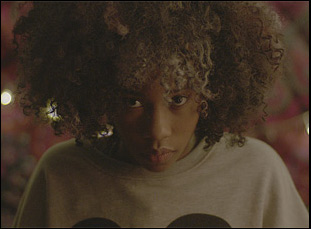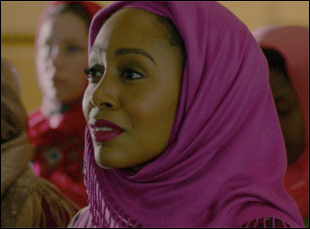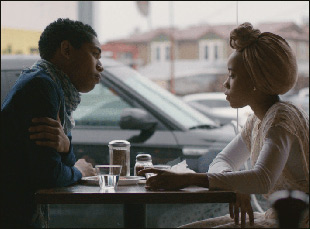Before filming commenced on “Jinn,” Nijla Mu’min had heard horror stories about other productions that had been stopped cold in their tracks when they couldn’t find the right lead. During the casting process, Mu’min also felt everything stop, but for entirely different reasons.
“We had seen hundreds of tapes from different actors and Zoe Renee submitted a self-tape where you’re watching it and you’re just like, ‘Who is this person? Where did she come from?’ [and have that feeling of] being fascinated and enchanted at the same time by a person,” recalls Mu’min. “Finding her was just magical.”
It’s a feeling that carries over to the whole of Mu’min’s mesmerizing debut “Jinn,” which is loosely inspired by Mu’min’s own experience of coming of age as a Muslim woman. In her debut feature, Mu’min doesn’t tell a story so much as fully immerse one in the perspective of Summer (Renee), a high schooler for whom the impending transition of college should be a breeze after a period of great uncertainty the year before, with her parents recently separating and her mother Jade (Simone Missick) discovering a newfound sense of purpose by converting to Islam, jeopardizing her position as the weatherperson at the local TV newscast in Los Angeles. At a time when Summer is also searching for an identity, she’s intrigued by the prospect of Islam, particularly when it may mean she may be seeing Tahir (Kelvin Harrson Jr.), a boy in her class she likes, at the same mosque, and in showing the different paths the mother and daughter take towards tapping into their spiritual side as well as the many others the two meet along their journey, Mu’min offers an all-too-rare look at a religion that is often rigidly defined and shows how that perception that feel like a trap for those who observe the faith.
Yet there are many ways in which “Jinn” is singular in its point of view, drawing on the diversity of experience Mu’min had before even becoming a filmmaker, whether it was pursuing poetry and photography in college or a stint teaching students of the same age as Summer at film workshops. While the writer/director may have scoured social media accounts of Muslim teens to get an idea of what it was like to bear that identity in America a generation removed from her own, there’s a purity to the expression that seems to emanate deeply from her own soul as the film will often casually break away from the narrative into cinematic portraiture where the words, picture and sound will reorient you to take in the story in a way that she’s lived with, but will likely be entirely new and refreshing for most audiences. After a celebrated run on the festival circuit that began earlier this year at SXSW, where “Jinn” won a Special Jury Award for writing, the film hits theaters and streaming services this week and Mu’min was gracious enough to take the time to talk about how she combined her artistic pursuits into one with filmmaking, visual influences for the film and avoiding oversimplification at every turn.

Yes, specifically for poetry, I wanted to make sure I was able to explore Summer’s mind, so there are points where she’s writing a paper or she’s speaking in her own mind that was my way of bringing poetry, these moments where we’re just collecting images – images that bring to life her inner thoughts – into this film. Photography was also really important just because of framing and really wanting to capture all of these beautiful faces and give them a way to build a tapestry of meaning in the story.
When you’ve got all those interests, how did film become something you wanted to pursue?
It was like a [process of] building up to it because I knew I wanted to be a filmmaker, but I didn’t really know everything that was involved. Where I grew up in the Bay Area, there just weren’t a lot of filmmakers around, and I didn’t know how hard it would be, but I started to teach myself, just watching movies and taking classes at U.C. Berkeley, where I started studying poetry and photography, but I just wanted to go bigger. I wanted to do more than just write poems. I wanted to do more than just take photos. I felt the next destination for me was to be making movies, so it was like a continuum, exploring all these different artforms and then landing on the one that would allow me to merge them all into one practice. That’s what cinema represented to me at the time and then I went on a years and years’ long journey of really perfecting the craft of being a screenwriter and a director.

It was a process. When I started working with my [cinematographer] Bruce Francis Cole, we started having a lot of conversations about light, about textures and fabric – the scarves, hair, everything – we wanted the world to encompass. We looked at different coming-of-age film’s, like Andrea Arnold’s “Fish Tank,” [Celine Schiamma’s] “Girlhood” and [Dee Rees’] “Pariah,” and talked about what we appreciated about them and what we wanted to do differently than those, which really contributed to the visual design for this film. But it was really knowing from the script how I wanted to capture this world visually – I knew that I wanted this to be very colorful, so we used different colors to signify different meanings – a lot of pinks, a lot of golds, and a lot of greens to give a kind of more natural feeling. We used darkness and silhouettes, especially towards the end where Summer and Tahir are nearing the Jinn and entering the passionate connection with each other.
Something I really love about the film is how you aren’t afraid of having characters whose behavior can be contradictory, but when the filmmaking process is often geared towards simplicity, is that difficult to protect?
Yeah, I did protect that because that’s just part of my practice as a writer and as an artist. I really, really push for complex, complicated characters who have contradictions, who have flaws, and who have strengths and it didn’t matter to me that “Oh, these are Muslims,” because sometimes with representations of Muslims, people feel like they have to show either an extremist or a perfect person… and that’s not what I wanted to show. [laughs] [with Zoe] I knew very early on that I had someone that would be perfect for the [lead] role of this film because she’s able to embody so many different emotions at the same time – she’s innocent and she’s beautiful and she’s mature and she’s confused – all these different emotions are able to be captured in her face and it was a strength to have an actor of that caliber at that age be able to carry a film.
And I was really passionate about exploring the grey areas of these characters’ personalities, which I know could be jarring for some audience members, but at the end of the day I think pushes us to connect and relate even more to them than if they were simplistic. And I had a team around me that wanted that – they wanted to have those complicated characters – so I didn’t really have to fight anyone, but I knew there were people, especially as we were editing the film and we had test screenings, who wanted things to be more clear cut. But I didn’t want to have easy answers.

Yeah, it is because there are parts of the film that are very different from my own personal experiences. That’s in part because of the visions that other people have brought onto the film and also the beautiful, unexpected nature of filmmaking where some times things change from what you had envisioned and you can either go with that and do something else or reject it. I was open to the different creative contributions that my team brought to the film, whether that was in terms of locations or the wardrobe and how these characters should dress or they should look – I had an idea of what that should be, but then they brought on their own ideas that helped to really, really elevate the visual design of the film.
[For instance] when I was growing up, the mosque that I attended was mostly African-American Muslims, the mosque location in the film and the people that we see in the mosque is one where you have different races and nationalities inside and that really added something beautiful to the film because it’s now a place where different people come and feel comfortable. So all of the different creative contributions that people brought made it a film that is relatable to so many people, not just my own personal vision, and I’m really happy with what we came up with.“Jinn” opens on November 16th in Los Angeles at the Pasadena Playhouse 7, the Plaza in Atlanta, the South Barrington 24 in Chicago, the Westminster Promenade 24 in Denver, the Barrywoods 24 in Kansas City, the Mesquite 30 in Dallas, the Wallowbrock 24 in Houston, the Apple Valley 15 in Minneapolis-St. Paul and the Forum 30 in Detroit. It will also be available on iTunes.





Comments 1